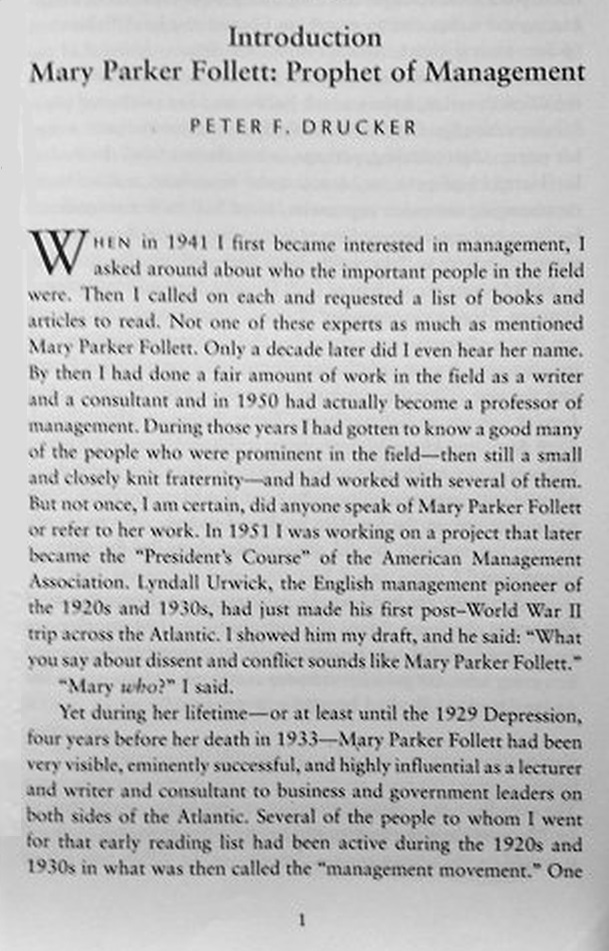
In the know: Growth mindset long overhyped | Father introduces Mother of Modern Management
In the know is a regular roundup of knowledge management (KM) topics of discussion and the articles, events, videos, and podcasts that are grabbing the attention of KM experts across our community.
Growth mindset long overhyped
As reported in a previous RealKM Magazine “In the know” article, evidence to support the idea of a “growth mindset” has been found seriously wanting.
In the time since, two systematic review and meta-analysis studies have further reviewed the growth mindset academic literature. One study1 looked at the academic achievement of students, and found that there is little evidence that adopting a growth mindset rather than a fixed mindset leads to higher achievement. The other study2 looked at growth mindset interventions, and concluded that, in certain circumstances, there can be positive effects.
Three commentary articles responding to the two systematic review and meta-analysis studies were then published. These commentaries were followed by a reply3 from the authors of the systematic review and meta-analysis that had looked at the academic achievement of students. They report that two of the commentaries support their original findings, and state that the third, which challenged their findings, is flawed. In conclusion, they restate their original observation, which is that:
Apparent effects of growth mindset interventions on academic achievement may be attributable to inadequate study design, reporting flaws, and bias.
Referencing the systematic review and meta-analysis that had looked at the academic achievement of students, Paul Fairlie, PhD writes in a LinkedIn post that:
I remember reviewing the small number of studies that existed 15 years ago to develop an assessment tool for a consulting firm and found the evidence wanting – certainly not enough to support a best-selling book at the time on growth mindsets. I conducted our own study on a national sample and found no relationship between growth mindsets and adult performance in organizations. Given the limited real estate on the firm’s new assessment tool, I recommended that they drop growth mindsets. A bit risky at the time. Since then, a lot of vendors have gotten rich on growth mindset tools.
Fairlie’s reflection shows how, despite only ever having a questionable evidence base, the notion of growth mindset has been overhyped throughout its existence, including by people who have put personal profit ahead of professional rigor.
As previously stated, this is a serious concern, because approaches based on growth mindset are being used in knowledge management (KM). Anyone who is using growth mindset in their KM work should immediately pause doing so, and then carry out a thorough review and reorientation using the two systematic review and meta-analysis studies and reply article referenced above.
With thanks to Bart Verheijen for letting us know about Paul Fairlie, PhD’s post and the two systematic review and meta-analysis studies and associated commentary,
Father introduces Mother of Modern Management
The contribution to knowledge management (KM) of “Father of Modern Management” Peter Drucker is widely recognised. However, as the RealKM Magazine article What about the role of the “Mother of Modern Management” in KM? alerts, the equally important contribution of “Mother of Modern Management” Mary Parker Follett has been largely ignored. As that article discusses, Mary Parker Follett’s work is important not only in regard to the evolution of KM, but also potentially to its future.
A Twitter comment in response to that article reveals that Peter Drucker actually wrote the introduction to Pauline Graham’s book Mary Parker Follett: Prophet of Management4. The following excerpt from the introduction shows that Drucker himself had been unaware of Mary Parker Follett and her important contribution. This begs a question: what other important contributions to KM have been or are being ignored?

With thanks to Bruce McTague for letting us know about Peter Drucker’s introduction in Pauline Graham’s book Mary Parker Follett: Prophet of Management.
References:
- Macnamara, B. N., & Burgoyne, A. P. (2023). Do growth mindset interventions impact students’ academic achievement? A systematic review and meta-analysis with recommendations for best practices. Psychological Bulletin, 149(3-4), 133–173. ↩
- Burnette, J. L., Billingsley, J., Banks, G. C., Knouse, L. E., Hoyt, C. L., Pollack, J. M., & Simon, S. (2023). A systematic review and meta-analysis of growth mindset interventions: For whom, how, and why might such interventions work? Psychological Bulletin, 149(3-4), 174–205. ↩
- Macnamara, B. N., & Burgoyne, A. P. (2023). A spotlight on bias in the growth mindset intervention literature: A reply to commentaries that contextualize the discussion (Oyserman, 2023; Yan & Schuetze, 2023) and illustrate the conclusion (Tipton et al., 2023). Psychological Bulletin, 149(3-4), 242–258. ↩
- Graham, P. (1995). Mary Parker Follett: Prophet of Management, A Celebration of Writings from the 1920s. Washington D.C.: Beard Books. ↩





Stuart Ritchie and Tom Chivers have an excellent podcast called “The Studies Show” that reviews flawed scientific studies, especially ones that lead to public misperceptions. They did an episode on Growth Mindset a few months ago:
https://www.thestudiesshowpod.com/p/episode-8-growth-mindset
Many thanks Dennis – I’ve included this in the latest “In the know” which is at https://realkm.com/2023/12/27/in-the-know-more-on-growth-mindset-the-center-for-implementation-openalex/